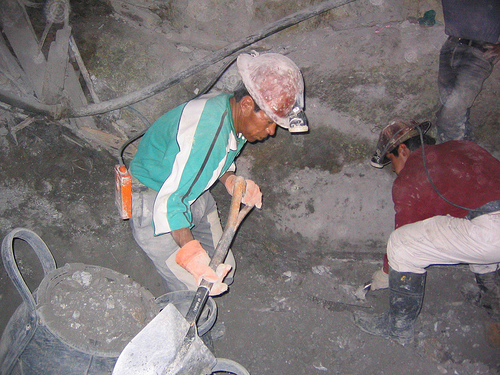Hard work spotlights the character of people: some turn up their sleeves, some turn up their noses, and some don’t turn up at all. – Sam Ewing

This looks like hard work. Not for those who aren’t in good shape, at least not as a career. But if a friend needed to plant a tree, would you help dig the hole?
What does that mean?
I laughed when I first saw this one. It is so true! I can name a dozen or so people for each of the different categories. And hundreds that fill the spaces between them. And I imagine you can name a person, right off the top of you head, for each of them as well, right?
But the willingness to do work, hard work especially, is considered a good trait in most cultures with which I am familiar. And nearly everyone likes having a good, hard worker around (except their lazy peers, that is). Those are the ones who turn up their sleeves, another way to say ‘roll up their sleeves,’ an action to protect the shirt from the labor about to ensue.
Those who turn up their noses, well they aren’t much help. They’re too good to do what needs to be done. Whatever it might be, they just aren’t going to do it. Perhaps it’s beneath them, or it’s too gross, or they might get dirty. We all have our limits, but these people set theirs a bit high.
The last group are those who are suddenly too busy to help with that project, or will be conveniently out of town, or hosting a distant relative. Really, they’d love to be there, but they just cant. Then there are those who don’t eve bother to make an excuse, they just don’t show.
Why is your character, and willingness to work, important?
Where do you fall on this spectrum? Are you the one everyone trusts to get it done, or at least pitch in? Or do they simply expect you to turn up your nose or bail on them when it comes time to get things done? What is your reputation, or your character, in the eyes of others?
Do they know you won’t help someone move, but will help with planning the next meeting or will balance the books? Do they trust you when you say that you’ll be there, or do they expect you to promise, then make an excuse? It all goes back to character, right? What is yours, and what is your reputation (that is, how well is it known to others)?
Where can I apply this in my life?
Just this week, in the parking garage of the hotel where we were staying, I crawled under my wife’s car and spent a half hour rigging up a temporary fix for some loose plastic under the car (part of the air-dam), which had been damaged earlier in the trip by some road debris.
We were staying at a really nice place, and one of the bellmen noticed, as I approached, that I had some dirt on the sleeve of my shirt and asked if he could brush it off for me. I laughed and turned around so he could see how dirty the rest of me got while I was up under the car. He looked kind of shocked, but what can I say, I’m a car guy! I love it!
Now, that said, there are some things I just wouldn’t do. If you’ve ever seen a show starring a guy named Mike Rowe called Dirty Jobs, then you know there are limits to what most people will do. Again, we all draw the limits, just in different places. The question is where is it, and are you willing to publicly stand by it?
The question is where do you draw yours? Some people won’t (or can’t) do heavy lifting. Others seem allergic to sweat, but give them something they can do while seated at a table in the air conditioning, and they’ll be busy all day. It doesn’t sound like much, until you need someone to write the newsletter, balance the books, or do research, right?
Do you avoid work that involves really gross things, or really smelly things? Does cleaning fish count as either of those, or is it part of the fun of a weekend fishing trip? What if you weren’t there for the fishing, but were asked to help out anyway. Would you? Or would you turn up your nose?
I do not believe that there are any truly right or wrong answers, I would just expect you to be willing to stand by your decisions. It is all about character, and letting people know what you are willing to do, what you can be counted on to do.
Whatever you are willing to do or not do, I just ask that you stand by your decisions, and let people know what they can count on you to do or not do.
If you have a bad back or a bum knee, you still may be able to help a friend move. Just stay away from the heavy lifting. But you might be able to help pack, right? If you are asked to help prepare the weekend’s catch, you might pitch it, if there’s some fish in it for you, right?
What are you willing to do? Be a stand-up kind of person and let people know so they know what to expect. Hard work is a great way to build character, and to get a reputation. Shirking it will also give you a reputation. Chose wisely.
From: Twitter, @AnitaDFiouris
confirmed at : http://www.brainyquote.com/quotes/quotes/s/samewing104937.html
Photo by Phillie Casablanca







Hi there,
I stumbled upon your blog when searching for the author of the quote “A ship is safe in harbor, but that’s not what ships are for.” I read the post you wrote about that quote and thought about commenting, but I continued reading the blog and found something similar in this post that I wanted to comment on. In your post about taking risks, most of the risks you mention are bodily risks, and in this post, all of the hard work you mention is physical work or work that affects the body in some way. I, too, think this kind of work is important, but in both posts you neglect to mention abstract risks and abstract hard work, both of which are equally, if not more, important. In my opinion, physical work and risk isn’t worth as much if it is experienced by itself, without abstract work and abstract risk.
To give an example: I am a community college student. Most students at my college are not willing to do their best work in their classes, but rather the amount of work that will merely allow them to “get by” in class. One might just call this laziness, but it seems like a little more than that to me. A few of my classes have been with good, difficult teachers. In these classes, students tend to resent the teacher for the difficulty of the work, and the classes usually dwindle down to about 5 or 10 students by the end of the semester. Although I have had a lot of difficult physical work in my life (I am a mechanic and a gardener, and I have been helping my parents build a house for several years), the most difficult (and some of the most important) work I’ve encountered is the abstract work in these difficult classes, such as uncovering explicitly the meaning of Robert Frost’s “Mending Wall” or writing an essay comparing and contrasting Hitler’s use of propaganda and modern marketing in America. I think that the reason most students resent the teachers of these classes and usually end up dropping is because they don’t want to risk themselves. Although they have a ship built to “ply the seas,” a mind built to ply the abstract world, they prefer to keep it in harbor for the small chance that it might fail them. They fear that their ship will fail them, and are perfectly okay with paddling around in the harbor. All this is to say, abstract work and abstract risk are just as important, and we definitely shouldn’t neglect them.
A very good point. I try to keep my posts to about 800 words, so I can’t go into everything. However, that’s what the comments section is all about. Thank you for your input, and for sharing your experience. As an engineer, I ply the uncharted seas of the abstract, the solving of the problems of others. I guess I’m so used to it, it never crossed my mind to apply it to the quotes. I also love to work with my hands, although I’m not that big on gardening (honestly, I have killed cactus plants, and that takes a special talent!). I wish you the best in your pursuits. Excellence, even if no one else notices, is a thrill to the inner self. Setting goals, and surpassing them. Imagining peaks, and then surmounting them. Puzzling on the meaning of quotes, poems, or your place in the world, these are all worthy pursuits. Just some pay better than others! Hope to hear from you again.